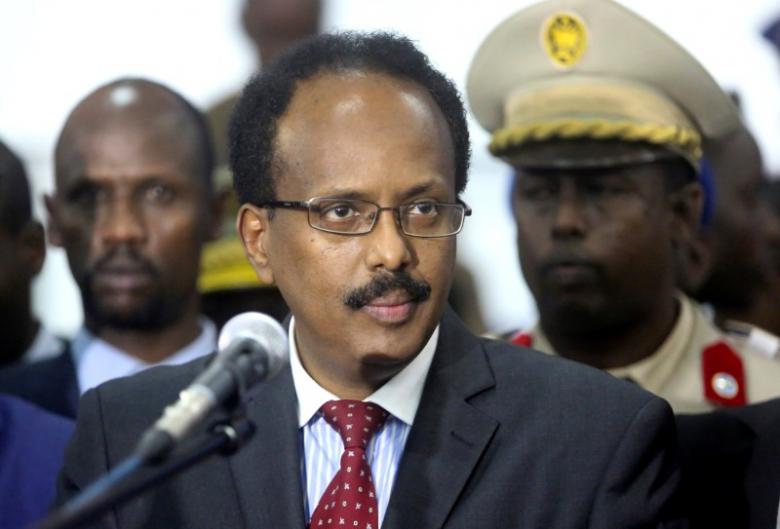Mogadishu– Somalia’s President Mohamed Abdullahi Mohamed said that defeating terrorism would pave the way for reviving the economy.
In an interview with Asharq Al-Awsat newspaper on the occasion of the passing of 100 days since he took office, Mohamed said that “changing the security situation” and overcoming terrorist threats, represented by ISIS and Al-Shabaab militant group, would allow the achievement of decent living conditions by stimulating economic growth and providing the Somalis with good job opportunities.
The Somali president said he “inherited a very difficult situation”, especially on the security level.
He noted in this regard that despite efforts exerted by the former government to counter terrorism, Al-Shabaab militants still represent “a real threat to stability in my country.”
“At the same time, I have inherited a difficult economic situation that does not allow the government to regularly pay the Army salaries,” he continued, stressing that the military institution was in need of comprehensive restructuring and rearmament.
As for social services, government’s capabilities are limited, according to the president, in particular with regards to health and educational services.
“I am not saying that we have to begin from nothing, but we have big challenges ahead compared to the available capacities,” he stated.
Asked about the reason he chose Saudi Arabia as his first state visit, Mohamed said: “This visit is a clear proof of the deep and historic relations between Somalia and the Kingdom.”
He underlined Saudi Arabia’s continuous support to Somalia at all levels. He added that Custodian of the Two Holy Mosques King Salman bin Abdulaziz has expressed his keenness to help the African country in facing its challenges.
As for the support provided by the Kingdom, the president said that Saudi Arabia has assisted Somalia in rebuilding its army, fighting terrorism, launching reconstruction projects, as well as supporting the state budget and responding to the drought crisis.
With regards to rebuilding the army, Mohamed, who goes by the nickname “Farmajo”, said that the issue was a priority in the new government’s program.
“We are seeking to build a professional army that is able to protect the borders, defend the country’s sovereignty and achieve stability,” he stated.
As for the African Union peacekeeping forces in Somalia (AMISOM), the president said that the current plan was to drive Al-Shabaab militants out of the country within the next two yeas, and gradually start reducing the number of peacekeeping forces as of October 2018, in line with the ongoing negotiations.
Asked about the arms embargo on Somalia since the beginning of the 1990s, Farmajo said that ongoing sanctions on the country were limiting the army’s capabilities.
“The current project to reorganize and restructure the army would not be effective if it is not paralleled with the lifting of sanctions,” the president noted.
“We are committed to this demand because we know that the support, which is offered by the African Union forces, would not last,” he added.
On wearing the military uniform twice since taking office in February, the Somali president said: “This is to remind the Somali people that we are in an open war against terrorism represented by Al-Shabaab movement.”
“I do not believe in the military choice alone,” he said, noting that after his election, he called for dialogue with the movement and offered to grant amnesty to militants who abandon arms and violence.
“We should admit that not all Al-Shabaab militants are the same; there are those who believe there are citizens just like us and they reject violence; and others, who are very extremists and influenced by al-Qaeda and who would not accept dialogue,” he said.
Asked about his visit to the United Arab Emirates, the Somali president said that the UAE was one of the biggest supporters to his country, describing his meetings in Abu Dhabi as “successful at all levels”.
As for the assistance needed from Arab countries and institutions to support Somalia, Mohamed highlighted the importance of investing in the country’s “tremendous economic resources, which include natural resources, maritime wealth and agriculture, as well as infrastructure and transport”.
“This can create job opportunities for the youth, who represent 70 percent of the Somali population,” he said.
He added that his government was ready to provide the required facilities for Arab investments.
